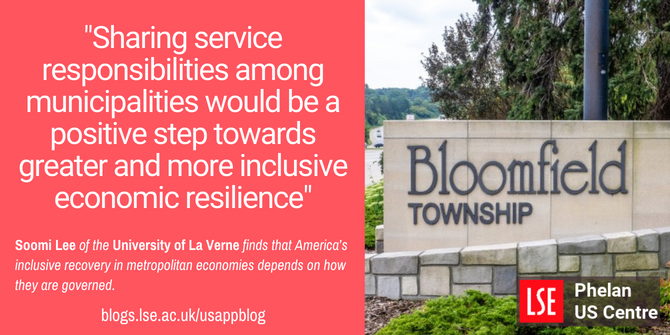 The US has more than 90,000 local governments; many of these are towns and cities within larger metropolitan areas. Soomi Lee and her coauthor Shu Wang look at how economic recovery can be uneven across cities within a region, finding that when there are many different municipal governments in one metropolitan area, this can hinder economic recovery following a recession, as local governments look after their own economic recovery and are less likely to collaborate with others. She writes that sharing responsibility for services among governments will likely lead to more inclusive economic resilience.
The US has more than 90,000 local governments; many of these are towns and cities within larger metropolitan areas. Soomi Lee and her coauthor Shu Wang look at how economic recovery can be uneven across cities within a region, finding that when there are many different municipal governments in one metropolitan area, this can hinder economic recovery following a recession, as local governments look after their own economic recovery and are less likely to collaborate with others. She writes that sharing responsibility for services among governments will likely lead to more inclusive economic resilience.
It is not rare to see an ailing city situated in a prosperous metropolitan area. Also, it is common to see different paces of economic recovery across cities in the same metropolitan economy after an economic recession. For instance, after the Great Recession, the City of Detroit in Michigan lost 22 percent of its real median household income and filed the largest municipal bankruptcy in US history. Only less than 30 miles away from Detroit, however, the City of Bloomfield Hills enjoyed a 12 percent income growth during the same period.
Economic resilience in American cities and regions
In the wake of the Great Recession, the idea of “economic resilience” gained popularity among academic commentators. It provides policymakers and regional planners with a useful lens to see how a region recovers from or adapts to outside shocks such as natural disasters and economic recessions. However, most discussions on the issue center on economic competitiveness or the growth of the overall region. As in the example of the Detroit Metropolitan Area, the (un)evenness of economic recovery across municipal boundaries within the same metropolitan area has received less attention. Nonetheless, if we only look at the region as a whole, we might miss the dynamics of the subsystems nested within the region.

ajay_suresh, CC BY 2.0, via Wikimedia Commons
In our research, we propose the concept of inclusive economic resilience to capture the (un)evenness of economic recovery among cities within a region. In investigating the factors contributing to inclusive economic resilience, we pay special attention to an important, yet overlooked factor, the fragmented governance structure in American metropolitan areas.
The importance of governance structures
According to the Census of Governments, the United States has more than 90,000 local governments, including 3,243 counties, 38,799 municipalities, and 51,276 special-purpose governments. A typical metropolitan area has 67 local governments, consisting of two counties, 19 municipalities, 11 school districts, and 28 special districts. The most extreme example is the New York metropolitan area which contains 1,711 local government units.
The number of governments, however, is only one of the dimensions of local fragmentation; Fiscal Dispersion is another. This captures how public service responsibilities are distributed. In a fiscally dispersed region, service responsibilities are shared relatively equally by sub-governmental units. In contrast, in a fiscally concentrated region, a few local governments bear the most service responsibilities regardless of the number of sub-regional units.
The governance structure is a crucial factor to consider because decisions made independently by cities do not always benefit neighboring cities or the entire region. In a highly fragmented governing structure, competition to recruit retail and commercial investment often precludes harmonized inter-local responses to combat region-wide problems. Voluntary collaborations between local governments are unlikely to succeed, especially for the issues such as economic development, land use control, and reducing fiscal disparities since these issues are perceived as a zero-sum game. During an economic recession, promoting local economic activities is the top priority for local governments to bring more revenues for services and maintain the tax base. Region-wide collaboration with other local governments may potentially benefit all stakeholders in the region, but local governments look after their own economic recovery since they are accountable to local voters.
More governments with more responsibilities can mean slower economic recovery.
Examining more than 300 US metropolitan areas during the Great Recession between 2007 and 2017, we find that different dimensions of local fragmentation exert different impacts on intra-regional economic resilience. Our results indicate that a larger number of municipal governments and greater service responsibilities borne by special and school districts lead to uneven economic recovery. In contrast, similar fiscal responsibilities taken by municipal governments promote inclusive income recovery.
For policymakers who are motivated to enhance inclusive resilience, incorporating more municipalities within a metropolitan area could be counterproductive in increasing inclusive economic recovery. Similarly, shifting service responsibilities to special districts would widen the recovery gap. Given the existing structure, however, sharing service responsibilities among municipalities would be a positive step towards greater and more inclusive economic resilience.
- This article is based on the paper, ‘Impacts of political fragmentation on inclusive economic resilience: Examining American metropolitan areas after the Great Recession’ in Urban Studies.
- Please read our comments policy before commenting.
- Note: This article gives the views of the author, and not the position of USAPP – American Politics and Policy, nor the London School of Economics.
- Shortened URL for this post: https://bit.ly/3Y36T6m






